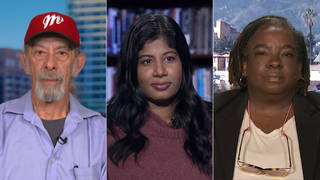
The AFL-CIO labor convention in Chicago this week has seen the largest rupture in the US labor movement for more than fifty years. Democracy Now! co-host and New York Daily News columnist Juan Gonzalez talks about the implications. [includes rush transcript]
The delegates of the AFL-CIO re-elected embattled president John Sweeney to his post yesterday. Prompted by the Change to Win Coalition’s agenda, delegates also voted to increase the national budget for organizing new unions. The convention, held this week in Chicago, saw several of the largest unions affiliated with the labor federation boycott the proceedings. The Service Employees International Union and the Teamsters stayed away and the United Food and Commercial Workers are expected to join with them in a new federation, which will be founded at a convention in September.
- Juan Gonzalez, Democracy Now! co-host and columnist for the New York Daily News.
Transcript
AMY GOODMAN: Big news, Juan, out of the AFL-CIO convention.
JUAN GONZALEZ: Yes. Historic news on many fronts, one obviously the split within the ranks of organized labor as several unions have pulled out. I think by the end of the week, not only the SEIU and Teamsters, but also the United Food and Commercial Workers will be pulling out, and as I reported in the Daily News in my column today, they’re expecting to hold a founding convention for a new federation of labor in September in the Midwest. So, they’re already moving ahead, those who have — the rebel groups that have split off from the AFL-CIO, and it looks like they’ll end up with a good — perhaps as much as 30% of the existing AFL, but also they’re looking to try to get other non-AFL unions, like the carpenters union, which has about 500,000 members. They’re even begun having talks with the N.E.A., the National Education Association, which is the largest union in the United States. It has 2.7 million members, but has never been part of the AFL. And they’re trying to see if they can woo the N.E.A. to join this new labor federation.
AMY GOODMAN: And do you think it will take a different approach?
JUAN GONZALEZ: Well, I think the jury is still out on that one. Clearly, the unions that have left have dedicated more efforts to organizing. They are definitely some of the more progressive unions, however they do have the problem that they have a lot of the same sort of top-down approaches of how do they organize workers, very centralist in their orientation. Still not clear on what is the role — very clear on what is the role of the American labor movement vis-a-vis the empire, the American empire. So that there are still lots of questions to be decided, but at least now, I think one good thing will happen is workers will now have choices. There will be two labor federations in the United States. There will probably be clear political differences between them that develop over the years. And so I think that the competition is probably good for the American labor movement, because the AFL-CIO has always operated on the basis of lowest possible denominator of operations. Now you will get more clear political lines from the two federations. And it’s not unusual. Many countries have contending labor federations. The United States has been kind of unique in having only one central labor federation.
AMY GOODMAN: Juan, before we move to our debate on subway searches, you have covered labor for many years. The end of the convention comes at the same time as the passage of CAFTA by one vote, 217-215. Just one vote would have tied it.
JUAN GONZALEZ: Yes, a big defeat for organized labor that put a lot of effort into it, and also the AFL unions threatened that any Democrat that backed CAFTA would not get their support. We’ll wait and see what happens on that, but also the other big thing about the AFL convention is the war resolution that you just talked about, the anti-war resolution. Historic for the AFL-CIO. It has never come out so clearly. All of the unions now from the left to the right of the AFL-CIO are now on record saying that they want U.S. troops pulled out of Iraq as soon as possible. That’s going to mean that all of these unions are going to financially support the peace movement from now on, and I think that’s going to be a big boost to the peace movement.
AMY GOODMAN: And Sweeney re-elected.
JUAN GONZALEZ: And, yes, Sweeney re-elected yesterday a day early. He was supposed to be re-elected today, but he was re-elected by acclamation yesterday. I suspect it’s because some of the AFL delegates are so disheartened by the split, they were eager to get out of Chicago as fast as possible and move on.













Media Options